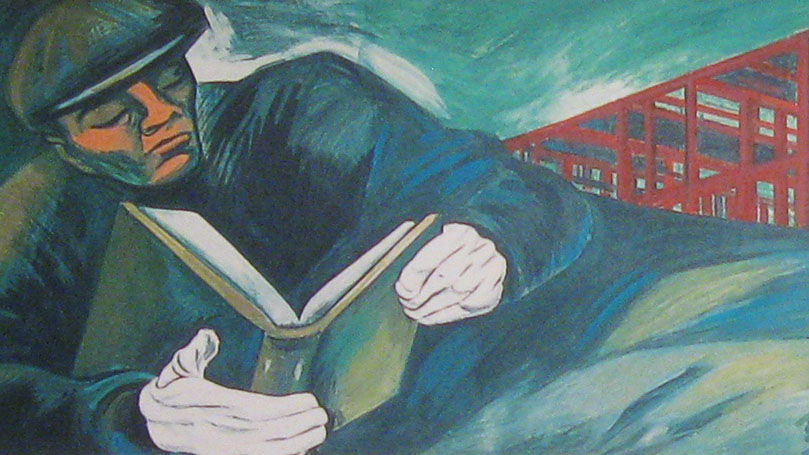
How to recognize a Communist: fist in the air, eyes on the horizon… and, whenever we can, nose stuck in a book! Check out these “best of the decade” book recommendations from members and friends of CPUSA. Happy reading!
Homegoing (Yaa Giassi, Knopf, 2016)
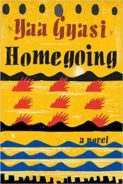 Homegoing, Giassi’s first novel, explores the lives of two Ghanian half-sisters born in the 18th Century and their descendants. The mother of the two gives birth first to Effia, who marries the British governor who is in charge of Cape Coast Castle. Her descendants remain on the continent. Their mother later gives birth to Esi, who is sold into slavery and spends time in the unspeakable conditions of the dungeon while, unbeknownst to her, her half-sister lives a luxurious life in the chambers of the castle above. Later, Esi deals with the dehumanizing horror of The Middle Passage and eventually enslavement in the U.S. South. The book follows her descendants’ struggle through Reconstruction, Jim Crow, and the Great Migration. At the same time Effia’s line deals with the wars between the Asante and Fante people brought on by colonialism and the slave trade. It’s a wonderful read and received glowing reviews. Warning: Some of the descriptions of the horrors the various characters experience can be disturbing, but they reflect the reality of the times and places.
Homegoing, Giassi’s first novel, explores the lives of two Ghanian half-sisters born in the 18th Century and their descendants. The mother of the two gives birth first to Effia, who marries the British governor who is in charge of Cape Coast Castle. Her descendants remain on the continent. Their mother later gives birth to Esi, who is sold into slavery and spends time in the unspeakable conditions of the dungeon while, unbeknownst to her, her half-sister lives a luxurious life in the chambers of the castle above. Later, Esi deals with the dehumanizing horror of The Middle Passage and eventually enslavement in the U.S. South. The book follows her descendants’ struggle through Reconstruction, Jim Crow, and the Great Migration. At the same time Effia’s line deals with the wars between the Asante and Fante people brought on by colonialism and the slave trade. It’s a wonderful read and received glowing reviews. Warning: Some of the descriptions of the horrors the various characters experience can be disturbing, but they reflect the reality of the times and places.
Capital in the Twenty-first Century (Thomas Piketty, Belknap Press, 2017)
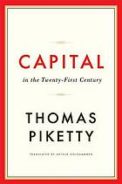 Piketty surveys economic data from the eighteenth century onward to argue that the capitalism locks in wealth inequality. The technical side of the argument goes as follows: in an economy where the rate of return on capital is higher than than the rate of economic growth overall, inherited wealth grows faster than earned wealth. As we see today, the disparity between the two can reach proportions that are not only mind-boggling, but incompatible with democracy. Piketty may not be a Marxist, but has become one of the most significant critics of economic inequality.
Piketty surveys economic data from the eighteenth century onward to argue that the capitalism locks in wealth inequality. The technical side of the argument goes as follows: in an economy where the rate of return on capital is higher than than the rate of economic growth overall, inherited wealth grows faster than earned wealth. As we see today, the disparity between the two can reach proportions that are not only mind-boggling, but incompatible with democracy. Piketty may not be a Marxist, but has become one of the most significant critics of economic inequality.
Black Revolutionary: William Patterson and the Globalization of the African-American Freedom Struggle (Gerald Horne, University of Illinois Press, 2013)
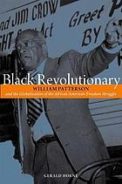
“[The case of the Scottsboro Nine] hit the nation–and more importantly, the world–with a crushing left hook. All of a sudden, official Washington was getting petitions and protests from around the planet, from workers in Germany, from the USSR, from Beirut, and from Johannesburg. In the words of Roy Wilkins, ‘through their international connections they [the Communists] made Scottsboro a household word’ throughout the world.”
In this book, the author makes the argument, very persuasively, that the Civil Rights Movement was more than a U.S. phenomenon; it was a world wide movement. And this was in part because of the work of US Communists and of William Patterson in particular. Of course, there are various ways to put this: this was all part of the workers’ and communist movement that swept the globe during the early and mid 20th century. U.S. activists, particularly Communists and especially African-American Communists played a crucial role.
The Stone Sky (N. K. Jemisin, Orbit, 2017)
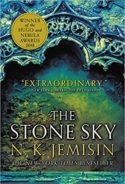 “When a comm builds atop a fault line, do you blame its walls when then inevitably crush the people inside? No; you blame whoever was stupid enough to think they could defy the laws of nature forever. Well, some worlds are built on a fault line of pain, held up by nightmares. Don’t lament when those worlds fall. Rage that they were built doomed in the first place.”
“When a comm builds atop a fault line, do you blame its walls when then inevitably crush the people inside? No; you blame whoever was stupid enough to think they could defy the laws of nature forever. Well, some worlds are built on a fault line of pain, held up by nightmares. Don’t lament when those worlds fall. Rage that they were built doomed in the first place.”
The Stone Sky is the third volume of N. K. Jemisin’s Broken Earth trilogy. Like the two preceding volumes, The Fifth Season and The Obelisk Gate, it won the Hugo Award for Best Novel, making Jemisin both the first Black author to win the award in that category and the first author ever to receive the award three years in a row. Her trilogy is set in a world prone to cataclysm, where societies develop under the threat of destruction in large-scale seismic, meteorological, and other disasters. The roots and the resolution of that planetary chaos are revealed in The Stone Sky. There’s plenty to love in the final volume, as in the trilogy as a whole, but what is most remarkable is Jemisin’s configuration of the relationship between society and nature. There’s something disquietingly familiar about her world, caught in a feedback loop where social inequality and environmental catastrophe exacerbate one another.
P.S. Don’t even think about reading this before the first two novels of the trilogy!
A Hidden History of the Cuban Revolution: How the Working Class Shaped the Guerillas’ Victory (Steve Cushion, Monthly Review Press, 2016)
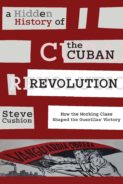
The Cuban Revolution did not start with the voyage of the Granma. It had much deeper roots in the struggles of the Cuban working class and people. Cushion’s book gives a detailed account of working class and labor struggles in Cuba before, during, and after the Revolution, demonstrating how these struggles made the revolutionary victory possible. It’s excellent reading for anyone who wants a deeper understanding of the working class basis of revolutionary action.
An Indigenous People’s History of the United States (Roxanne Dunbar-Ortiz, Beacon Press, 2015)
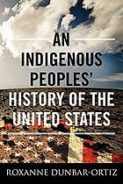 An Indigenous People’s History of the United States is a decolonizing history focused on the campaign of expropriation and genocide waged by European settlers against the indigenous nations of what is now the United States. Just as importantly, it sheds light on the long and continuing resistance of those nations. The author analyzes the development of the U.S. as a settler-colonial state whose dominant ideology fused democratic ideals with white supremacy, linking empowerment of ‘the common man’ to the displacement and murder of indigenous people. This is an essential book for our moment: the age of Trump (who hung a portrait of Andrew Jackson in the Oval Office) and of progressive political ferment, when the meaning and future of democracy in this country has become an object of struggle. It warns us against an uncritical and myopic embrace of the [first] American Revolution and reminds us of how much work remains to be done before true democracy can be achieved.
An Indigenous People’s History of the United States is a decolonizing history focused on the campaign of expropriation and genocide waged by European settlers against the indigenous nations of what is now the United States. Just as importantly, it sheds light on the long and continuing resistance of those nations. The author analyzes the development of the U.S. as a settler-colonial state whose dominant ideology fused democratic ideals with white supremacy, linking empowerment of ‘the common man’ to the displacement and murder of indigenous people. This is an essential book for our moment: the age of Trump (who hung a portrait of Andrew Jackson in the Oval Office) and of progressive political ferment, when the meaning and future of democracy in this country has become an object of struggle. It warns us against an uncritical and myopic embrace of the [first] American Revolution and reminds us of how much work remains to be done before true democracy can be achieved.
How to Be an Antiracist (Ibram X. Kendi, Random House, 2019)
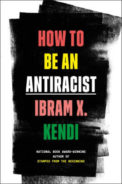 “The only way to undo racism is to consistently identify and describe it — and then dismantle it.”
“The only way to undo racism is to consistently identify and describe it — and then dismantle it.”
Probably one of the most important books for our current period in ‘post-racial’ America (pay close attention to the quotes there). Kendi builds off of his previous work in Stamped from the Beginning, where he described the beginnings of racist ideas from King Henry in Portugal all the way to Dinesh D’Souza’s “The End of Racism.” In this work, he defines ‘racist’ or ‘antiracist’ as someone who is supporting a racist or antiracist policy through their actions, or expressing a racist or antiracist idea. Drawing on his own experience (including his battle with cancer), Kendi explores the ‘talented tenth’, double consciousness, Black nationalism, biological racism, ethnic racism, cultural racism, colorism, anti-whiteness, and the intersection of race, class, gender, and sexuality.
The Half Has Never Been Told: Slavery and the Making of American Capitalism (Edward E. Baptist, Basic Books, 2014)
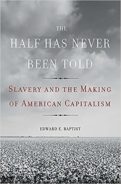 This beautifully constructed account, thoroughly researched using old and new sources, accurately presents the brutality of and resistance to slavery, as well as national political domination by the slave power whose economic dynamism pushed industrial growth in the U.S., England and northeastern Europe. Baptist argues that the overreach of expanding slavery led to the combination of those seeking to preserve the nation with those seeking to end slavery. An outstanding historical account.
This beautifully constructed account, thoroughly researched using old and new sources, accurately presents the brutality of and resistance to slavery, as well as national political domination by the slave power whose economic dynamism pushed industrial growth in the U.S., England and northeastern Europe. Baptist argues that the overreach of expanding slavery led to the combination of those seeking to preserve the nation with those seeking to end slavery. An outstanding historical account.
“The Most Dangerous Communist in the United States”: A Biography of Herbert Aptheker (Gary Murrell, University of Massachusetts Press, 2015)
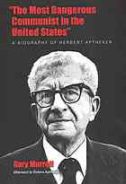 In the mid-1960s FBI director J. Edgar Hoover called the Marxist historian and Communist Party USA leader “the most dangerous communist in the United States” due to his presence on college and university campuses, where he helped to popularize the positions and perspectives of the CPUSA. The biography of Aptheker, by Gary Murrell, resurrects Apthker and places him and the CPUSA at the center of the 1960s civil rights, peace and youth and student upsurge. Contrary to the traditional narrative, Communists like Aptheker, Angela Davis and others, continued to play a central role in the various movements and struggles of the second half of the 20th century. By chronicling the life and times of one of the most well known Communists in U.S. history, Murrell has done a tremendous service. Progressives, activists, scholars – everyone – would do well to analyze and understand the complex history of this complex man and his ground-breaking work on African American history. Aptheker’s American Negro Slave Revolts alone (as well as his other scholarly works and academic and polemic articles) are worth studying. Murrell’s biography brings Aptheker, his beliefs and flaws, into focus and helps us understand not only the man, but also the movements he helped to build over the course of 60 years.
In the mid-1960s FBI director J. Edgar Hoover called the Marxist historian and Communist Party USA leader “the most dangerous communist in the United States” due to his presence on college and university campuses, where he helped to popularize the positions and perspectives of the CPUSA. The biography of Aptheker, by Gary Murrell, resurrects Apthker and places him and the CPUSA at the center of the 1960s civil rights, peace and youth and student upsurge. Contrary to the traditional narrative, Communists like Aptheker, Angela Davis and others, continued to play a central role in the various movements and struggles of the second half of the 20th century. By chronicling the life and times of one of the most well known Communists in U.S. history, Murrell has done a tremendous service. Progressives, activists, scholars – everyone – would do well to analyze and understand the complex history of this complex man and his ground-breaking work on African American history. Aptheker’s American Negro Slave Revolts alone (as well as his other scholarly works and academic and polemic articles) are worth studying. Murrell’s biography brings Aptheker, his beliefs and flaws, into focus and helps us understand not only the man, but also the movements he helped to build over the course of 60 years.
My Struggle (Karl Ove Knausgaard, various publishers, 2012–2019)
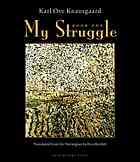 “The Nazis didn’t kill six million Jews. They killed one, and one, and one, six million times.”
“The Nazis didn’t kill six million Jews. They killed one, and one, and one, six million times.”
My Struggle (Min Kamp in the Norwegian original) is a 6-volume novel about a guy with the same name and life as the author writing a book about a guy writing a novel about a guy with the same name and writing a book about his life. Nothing about politics until — boom! A 400 page essay on Mein Kamp! Which, incidentally, is preceded by a 200 page essay on one poem by a Romanian poet. That doesn’t sound like a novel, you say? No, it doesn’t. But it is. Why did Knausgaard chose that title? Partly because he has a dark sense of humor, partly because he knew he was going to end it with the essay on Hitler (which evokes Trump every step of the way–not an accident, as the last volume was written mostly after the election).
Disoriental (Négar Djavedi, Europa Editions, 2018)
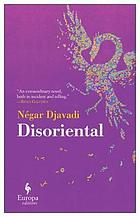
Disoriental, Négar Djavedi’s debut novel, is a deep family saga as well as an autobiographical coming of age story. It centers on an Iranian girl whose politically engaged, dissident family fled to France as refugees in 1981. Biography and history merge beautifully, and Tina A. Kover’s translation reads as if it were an original.
Jackson Rising: The Struggle for Economic Democracy and Black Self-Determination in Jackson, Mississippi (Edited by Kali Akuno and Ajamu Nangwaya, Daraja Press, 2017)
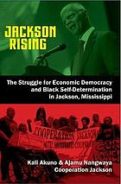 Jackson Rising brings together a series of articles describing the journey of the Malcolm X Grassroots Movement and other revolutionary Black nat ionalist organizations in West Jackson, MS toward winning power in the election of mayor Chokwe Lumumba, followed by Lumumba’s death on the verge of creating a federation of majority Black worker cooperatives in the area. It gives a general blueprint of how they have organized community councils, undertaken electoral struggles, and developed worker self-managed enterprises, urban farming communities, community land trusts, and mutual aid networks with local credit unions. Jackson, MS is currently the major battleground against gentrification in the U.S. and this book describes how they are fighting it. Many younger leftists are inspired by Cooperation Jackson and want replicate their project in other cities.
Jackson Rising brings together a series of articles describing the journey of the Malcolm X Grassroots Movement and other revolutionary Black nat ionalist organizations in West Jackson, MS toward winning power in the election of mayor Chokwe Lumumba, followed by Lumumba’s death on the verge of creating a federation of majority Black worker cooperatives in the area. It gives a general blueprint of how they have organized community councils, undertaken electoral struggles, and developed worker self-managed enterprises, urban farming communities, community land trusts, and mutual aid networks with local credit unions. Jackson, MS is currently the major battleground against gentrification in the U.S. and this book describes how they are fighting it. Many younger leftists are inspired by Cooperation Jackson and want replicate their project in other cities.
Revolution 2.0: The Power of the People Is Greater than the People in Power (Wael Ghonim, Houghton Mifflin Harcourt, 2012)
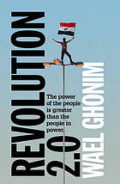 Using social media, community organizing skills and a whole lot of courage, Wael Ghonim helped initiate the protests that led to the toppling of the Mubarick regime in Egypt. Revolution 2.0 tells the story how, horrified by the killing of a taxi driver, Ghonim by means of Facebook organizing created a social media and on-the-ground campaign involving millions. Remarking on the people powered events he’s observed, “Our revolution is like Wikipedia, okay? Everyone is contributing content, [but] you don’t know the names of the people contributing the content. This is exactly what happened. Revolution 2.0 in Egypt was exactly the same. Everyone contributing small pieces, bits and pieces. We drew this whole picture of a revolution. And no one is the hero in that picture.”
Using social media, community organizing skills and a whole lot of courage, Wael Ghonim helped initiate the protests that led to the toppling of the Mubarick regime in Egypt. Revolution 2.0 tells the story how, horrified by the killing of a taxi driver, Ghonim by means of Facebook organizing created a social media and on-the-ground campaign involving millions. Remarking on the people powered events he’s observed, “Our revolution is like Wikipedia, okay? Everyone is contributing content, [but] you don’t know the names of the people contributing the content. This is exactly what happened. Revolution 2.0 in Egypt was exactly the same. Everyone contributing small pieces, bits and pieces. We drew this whole picture of a revolution. And no one is the hero in that picture.”
It’s an exciting, read twice, can’t-put-it-down diary of how the Tahir Square revolution unfolded.
London Recruits: The Secret War against Apartheid (Edited by Ken Keable, Merlin Press, 2012)
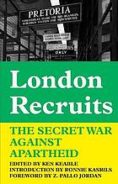 London Recruits compiles the fascinating, inspiring stories about young white student activists, mainly Communists from the United Kingdom, who traveled to apartheid South Africa posing as tourists but in reality were covertly transporting weapons and distributing propaganda for the African National Congress. These brave men and women risked their lives in solidarity with the struggle against racism and imperialism.
London Recruits compiles the fascinating, inspiring stories about young white student activists, mainly Communists from the United Kingdom, who traveled to apartheid South Africa posing as tourists but in reality were covertly transporting weapons and distributing propaganda for the African National Congress. These brave men and women risked their lives in solidarity with the struggle against racism and imperialism.
Image: A worker reads on a construction site. Detail from The Epic of American Civilization (José Clemente Orozco).


 Join Now
Join Now